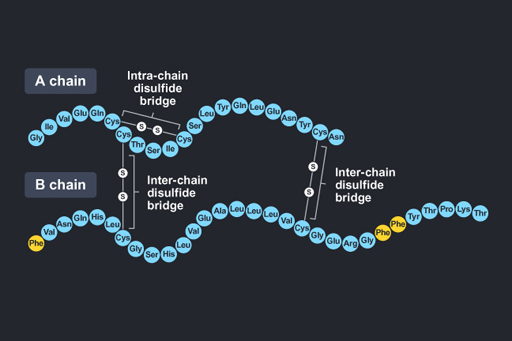2.2 Phenylketonuria
One of the common amino acids in our diet is phenylalanine (pronounced fee – nile – alla – neen). Its abbreviation is Phe. Have a look at the structure of the insulin protein in Figure 5 and see how often phenylalanine occurs in it.
Phenylalanine is found in many high-protein foods such as meat, fish, eggs, cheese and milk. However, there is a rare genetic defect – phenylketonuria (PKU) – present from birth, which makes some people unable to break down this amino acid. In people with PKU, the extra phenylalanine they take in, which is not needed to make their own proteins, builds up in their blood and other tissues. There is more information about PKU on the website of The National Society for Phenylketonuria: [Tip: hold Ctrl and click a link to open it in a new tab. (Hide tip)]
If undetected, PKU damages the brain and nervous system. This can lead to learning disabilities and other problems, probably requiring lifelong care. However, if the PKU is detected early enough, the person can be put on a low-protein diet with amino acid supplements without phenylalanine. This ensures that there is enough of the other amino acids and they should then remain perfectly well.
‘Early enough’ means very early in life! All babies in the UK and most other developed countries are routinely screened for phenylalanine level by the heel prick test. This is done within the first week of a baby’s life. Other rare but serious conditions are also tested for, using the same drop of blood.
If PKU is detected, the baby will be put on a special low-protein formula milk with supplementary amino acids. The child will need to continue on a low-protein diet. As an adult, they may be able to resume a normal or near-normal diet. If not, they may need to maintain a low-protein diet throughout their life.

